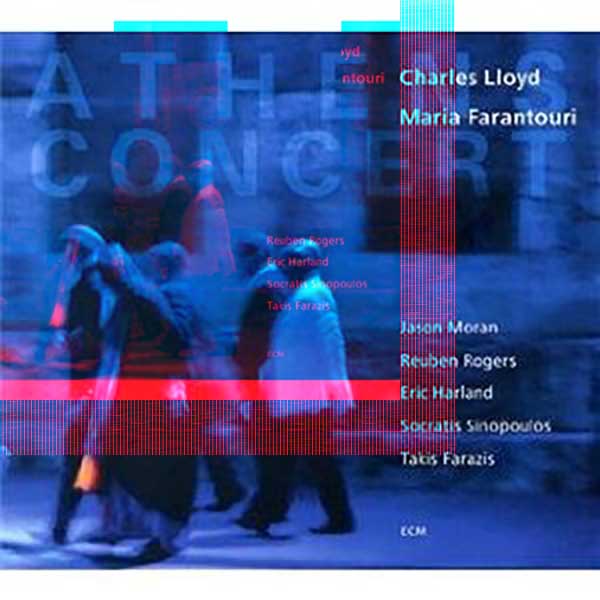




by Tim Owen
October 16, 2011
/ ALBUM LIVE
Lloyd's latest blends the empathetic spirituality he bought to traditional American sources on the post-9/11 album 'Lift Every Voice' with the music of a very different tradition.
Charles Lloyd / Maria Farantouri
Athens Concert
ECM
Charles Lloyd is almost guaranteed to side-step expectation with each new release, but this is undoubtedly one of his boldest and most personal recordings to date. His latest album for ECM blends the empathetic spirituality he bought to the traditional American sources on the post-9/11 album ‘Lift Every Voice’ with the music of a very different tradition, in collaboration with the Greek singer Maria Farantouri.
?Athens Concert’ is a double album, recorded ?live’ at Herod Atticus Odeon, Athens, in June 2010, with a mixed American/Greek ensemble. The concert must have been quite an event. The Herod Atticus Odeon is a concert venue created from the original 2nd century amphitheatre, located on a slope of the Acropolis of Athens, and I can only assume that it is a richly atmospheric setting. You can certainly catch a sense of occasion from these recordings, which test the versatility of Farantouri’s contralto in a set that combines traditional and contemporary Greek sources with original Lloyd compositions.
Farantouri has a long history of collaboration with composers as distinctive and distinct as Mikis Theodorakis and Vangelis. In 2010, Alpha TV ranked her Greece’s 18th top-certified female artist of the half decade since 1960. She first appeared on stage with Lloyd in Greece in 2003, to sing his song “Blow Wind”. Here she reprises the performance, singing Lloyd’s text in accented English with an uncontrived gospel feel. Elsewhere on Lloyd’s material her delivery has a slight theatrical aspect that I usually wouldn’t warm to, but mostly I can understand Lloyd’s admiration: “The resonance of her voice”, he writes in the album notes, “stirred the memory of my love for Lady Day”. Apparently Lloyd has visited Farantouri in Greece every year since that first meeting, and the long gestation of his engagement with the country, its culture (as a one-time member of the Greek parliament, Farantouri is equally well known in Greece for her political and cultural activism) and musical traditions has found very convincing expression in this body of work.
The core members of the Athens ensemble are Lloyd’s working quartet, which debuted on record with a 2007 live set (also for ECM), ?Rabo de Nube’. They are Jason Moran on piano; Reuben Rogers, double bass; and Eric Hartland drums. They are joined by Socratis Sinopoulos, a regular Farantouri collaborator, on lyra with a “mystical sound” that, as Lloyd writes, “adds an entirely ?other’ dimension” to the Americans’ jazz conception.
A quartet rendition of Lloyd’s classic “Dream Weaver” is rhythmically locked-in, with a nigh-on perfectly conceptualized solo from Moran. Elsewhere, the concert isn’t entirely free of the formality that’s characteristic of any high-minded cross-cultural exchange, but that sense diminishes as the performance progresses, and right from the start any shifts in register can be dramatically abrupt, as when a piano solo breaks out of the balladic song form of “Requiem”, snapping the listener to attention. Lloyd solos with sensitively realized freedom throughout, variously probing on the combustible “Espano sto xero homa”, and achingly poignant on “Taxi sta Kythera”, which closes the first disc. Here Lloyd’s saxophone expresses emotion with an eloquence that even Farantouri’s voice would struggle to match.
The highlights are undoubtedly the three lengthy parts of “The Greek Suite”, which comprises eleven themes of mostly traditional origin. These were arranged by pianist Takis Farazis, who Lloyd credits with making “an enormous contribution by connecting the dots between the structures of Greek tradition and the open borders of improvised music”. Farazis sits in on the “Greek Suite” tracks as a second pianist, and with Farantouri singing predominantly in Greek, Lloyd often turns to the flute and tarogato to forge a shared vernacular. As Part III takes the concert to its conclusion, the ensemble responds to every dynamic shift in those traditional structures by maximising the drama of every improvised instrumental break, no matter how brief. A terrific drum solo in “Alismono k? h?rom?”, for example, is answered by a powerful statement from the ensemble led by Sinopoulos lyra, minus Lloyd and Farantouri, that leads into the climactic verses of “Tou hel’ to kastron”, and Lloyd’s climactic solo statement. A final track, “Yanni mou” presents a forceful distillation of the evening, allowing each performer the freedom to sign off with a personal flourish.
This is a highly recommended album. It’s a fine testament to Lloyd’s musical precocity, to his band’s versatility and inventiveness, and to the broad-minded inclusiveness of the ECM label. Any fans of Lloyd certainly shouldn’t miss it.
blog comments powered by Disqus